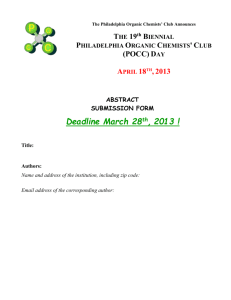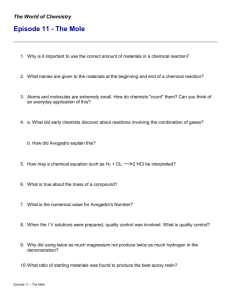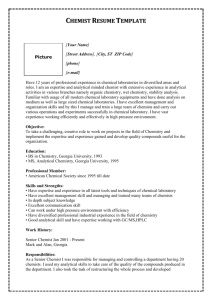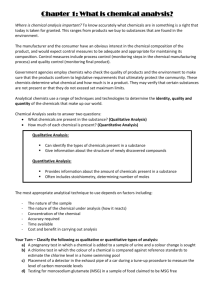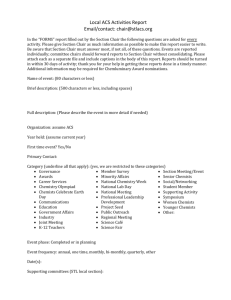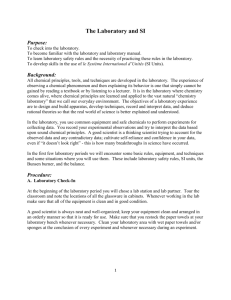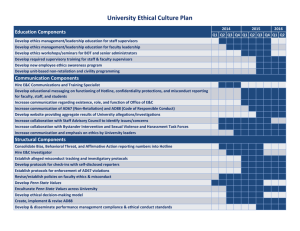Ethics W2
advertisement
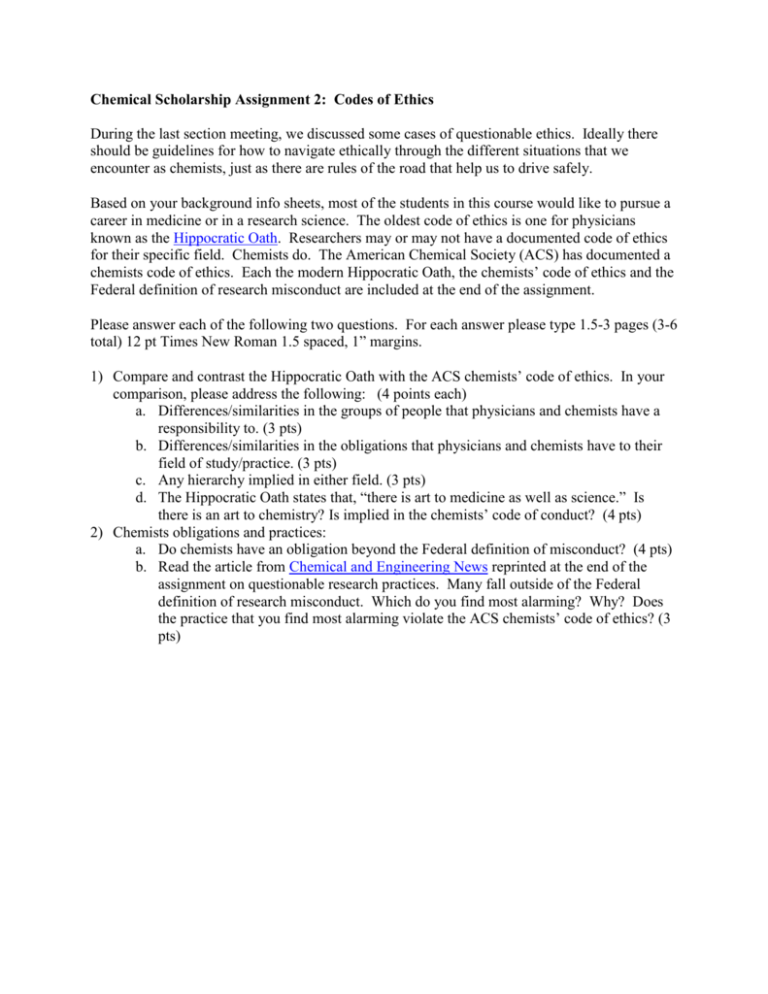
Chemical Scholarship Assignment 2: Codes of Ethics During the last section meeting, we discussed some cases of questionable ethics. Ideally there should be guidelines for how to navigate ethically through the different situations that we encounter as chemists, just as there are rules of the road that help us to drive safely. Based on your background info sheets, most of the students in this course would like to pursue a career in medicine or in a research science. The oldest code of ethics is one for physicians known as the Hippocratic Oath. Researchers may or may not have a documented code of ethics for their specific field. Chemists do. The American Chemical Society (ACS) has documented a chemists code of ethics. Each the modern Hippocratic Oath, the chemists’ code of ethics and the Federal definition of research misconduct are included at the end of the assignment. Please answer each of the following two questions. For each answer please type 1.5-3 pages (3-6 total) 12 pt Times New Roman 1.5 spaced, 1” margins. 1) Compare and contrast the Hippocratic Oath with the ACS chemists’ code of ethics. In your comparison, please address the following: (4 points each) a. Differences/similarities in the groups of people that physicians and chemists have a responsibility to. (3 pts) b. Differences/similarities in the obligations that physicians and chemists have to their field of study/practice. (3 pts) c. Any hierarchy implied in either field. (3 pts) d. The Hippocratic Oath states that, “there is art to medicine as well as science.” Is there is an art to chemistry? Is implied in the chemists’ code of conduct? (4 pts) 2) Chemists obligations and practices: a. Do chemists have an obligation beyond the Federal definition of misconduct? (4 pts) b. Read the article from Chemical and Engineering News reprinted at the end of the assignment on questionable research practices. Many fall outside of the Federal definition of research misconduct. Which do you find most alarming? Why? Does the practice that you find most alarming violate the ACS chemists’ code of ethics? (3 pts) Modern Hippocratic Oath1 I swear to fulfill, to the best of my ability and judgment, this covenant: I will respect the hard-won scientific gains of those physicians in whose steps I walk, and gladly share such knowledge as is mine with those who are to follow. I will apply, for the benefit of the sick, all measures which are required, avoiding those twin traps of overtreatment and therapeutic nihilism. I will remember that there is art to medicine as well as science, and that warmth, sympathy, and understanding may outweigh the surgeon's knife or the chemist's drug. I will not be ashamed to say "I know not," nor will I fail to call in my colleagues when the skills of another are needed for a patient's recovery. I will respect the privacy of my patients, for their problems are not disclosed to me that the world may know. Most especially must I tread with care in matters of life and death. If it is given me to save a life, all thanks. But it may also be within my power to take a life; this awesome responsibility must be faced with great humbleness and awareness of my own frailty. Above all, I must not play at God. I will remember that I do not treat a fever chart, a cancerous growth, but a sick human being, whose illness may affect the person's family and economic stability. My responsibility includes these related problems, if I am to care adequately for the sick. I will prevent disease whenever I can, for prevention is preferable to cure. I will remember that I remain a member of society, with special obligations to all my fellow human beings, those sound of mind and body as well as the infirm. If I do not violate this oath, may I enjoy life and art, respected while I live and remembered with affection thereafter. May I always act so as to preserve the finest traditions of my calling and may I long experience the joy of healing those who seek my help. 1 http://www.pbs.org/wgbh/nova/doctors/oath_modern.html (Accessed September 2005) Chemists Acknowledge Responsibilities To:2 2 The Public Chemists have a professional responsibly to serve the public interest and welfare and to further knowledge of science. Chemists should actively be concerned with the health and welfare of co-workers, consumer and the community. Public comments on scientific matters should be made with care and precision, without unsubstantiated, exaggerated, or premature statements. The Science of Chemistry Chemists should seek to advance chemical science, understand the limitations of their knowledge, and respect the truth. Chemists should ensure that their scientific contributions, and those of the collaborators, are thorough, accurate, and a unbiased in design, implementation, and presentation. The Profession Chemists should remain current with developments in their field, share ideas and information, keep accurate and complete laboratory records, maintain integrity in all conduct and publications, and give due credit to the contributions of others. Conflicts of interest and scientific misconduct, such as fabrication, falsification, and plagiarism, are incompatible with this Code. The Employer Chemists should promote and protect the legitimate interests of their employers, perform work honestly and competently, fulfill obligations, and safeguard proprietary information. Employees Chemists, as employers, should treat subordinates with respect for their professionalism and concern for their well-being, and provide them with a safe, congenial working environment, fair compensation, and proper acknowledgment of their scientific contributions. Students Chemists should regard the tutelage of students as a trust conferred by society for the promotion of the student's learning and professional development. Each student should be treated respectfully and without exploitation. Associates Chemists should treat associates with respect, regardless of the level of their formal education, encourage them, learn with them, share ideas honestly, and give credit for their contributions. Clients Chemists should serve clients faithfully and incorruptibly, respect confidentiality, advise honestly, and charge fairly. The Environment Chemists should understand and anticipate the environmental consequences of their work. Chemists have responsibility to avoid pollution and to protect the environment. http://www.chemistry.org/portal/a/c/s/1/acsdisplay.html?DOC=membership%5Cconduct.html (Accessed September 2005) The Federal government defines research misconduct as follows: Research misconduct is defined as fabrication, falsification, or plagiarism in proposing, performing, or reviewing research, or in reporting research results. - Fabrication is making up data or results and recording or reporting them. - Falsification is manipulating research materials, equipment, or processes, or changing or omitting data or results such that the research is not accurately represented in the research record. - Plagiarism is the appropriation of another person’s ideas, processes, results, or words without giving appropriate credit. - Research misconduct does not include honest error or differences of opinion. NAUGHTY SCIENTISTS One-third of scientists in a recent survey admitted to questionable practices; should we be worried? BY RON DAGANI Okay, the jig's up. scientists, it turns out, are neither perfect nor perfectly ethical. Some are flawed human beings, not unlike some businesspeople, journalists, politicians, entertainers, law-enforcement officials, and clergy (just to mention a few other groups that have been touched by scandal in recent times). Scientists' flaws include engaging in a wide range of questionable research practices. Everyone's heard of cases of gross scientific misconduct, such as fabricating or plagiarizing results; these can end up in the headlines. But there are many other behaviors that can compromise the integrity of research, and those were thrust into the limelight earlier this month when Nature (2005, 435, 737) published the results of a survey in which more than 3,200 scientists fessed up to "behaving badly." The survey--conducted in 2002 by Brian C. Martinson of HealthPartners Research Foundation, in Minneapolis, and two colleagues at the University of Minnesota, Twin Cities--focused on early- and midcareer U.S. researchers who were supported by the National Institutes of Health. Survey respondents were asked by mail to report whether or not they had engaged in a number of behaviors during the previous three years. One-third of the respondents said they had engaged in at least one of the 10 most serious behaviors on the list--those that a sampling of university compliance officers regarded as likely to be sanctionable. Among those "top 10" behaviors and the percentage of respondents admitting to them are the following: Falsifying or "cooking" research data (0.3%). Ignoring major rules protecting human subjects (0.3%). Engaging in relationships with students, research subjects, or clients that may be interpreted as questionable (1.4%). Using another's ideas without obtaining permission or giving due credit (1.4%). Failing to present data that contradict one's own previous research (6%). Overlooking others' use of flawed data or questionable interpretation of data (12.5%). Changing the design, methodology, or results of a study in response to pressure from a funding source (15.5%). Other behaviors (not in the top 10) include inappropriately assigning authorship credit (10%), dropping data points from an analysis based on a gut feeling that they were inaccurate (15.3%), and keeping inadequate records related to research projects (27.5%). These findings certainly are not good news for the scientific enterprise, but they're not particularly surprising either. As the researchers note in their report: "The modern scientist faces intense competition, and is further burdened by difficult, sometimes unreasonable regulatory, social, and managerial demands. This mix of pressures creates many possibilities for the compromise of scientific integrity" that extend well beyond the official definition of research misconduct, which is "fabrication, falsification, or plagiarism [FFP] in proposing, performing, or reviewing research, or in reporting research results." Nevertheless, the survey results are worrisome because they reveal a pervasive breakdown in the ethical practice of science. Furthermore, it's possible that these research behaviors are being underreported, with the worst offenders being reluctant to participate, despite assurances of anonymity. But have these behaviors actually hurt science in a significant way? The survey offers no clue. Commentators have pointed out other deficiencies of the survey. For example, many of the questions were worded so vaguely that they could also refer to actions that aren't objectionable. For example, a researcher might decide to modify the design of an experiment to improve it, based on a legitimate suggestion from a funding source. Yet in filling out the survey, a "yes" answer to this question would count as admitting to a no-no. It's also unclear whether ethical lapses and other questionable behaviors have become more common as science has become more competitive. In the absence of retrospective data, I think it's likely that these behaviors have occurred widely for a long time--indeed, for as long as people have tried to get ahead with less work, less attention to detail, or less regard for ethics. There are some indications, though, that certain kinds of misconduct are on the rise. For instance, chemistry journal editors are seeing a growing number of cases in which authors are trying to publish essentially the same manuscript in different journals, a practice known as duplicate submission, or are plagiarizing their own previously published papers--self-plagiarism (see page 4). So are ethical standards collapsing? Or are many--particularly, newly minted--scientists just unaware of what's right and wrong in the lab? Further research on scientists' behaviors, particularly the factors that motivate them to misbehave, could shed light on these questions. Also, perhaps it's time to make ethics education more widely available and even mandatory for all budding young scientists. Some universities have long offered courses or classes in research ethics (C&EN, April 26, 2004, page 33), but not everyone who should be exposed to them is. In addition, it may be time for the official definition of misconduct in research to be expanded beyond FFP. This is a controversial notion, but it would send a strong signal that other ethical lapses will no longer be tolerated. With any luck, such initiatives may help to curb the darker side of human nature. Chemical & Engineering News ISSN 0009-2347 Copyright © 2005
